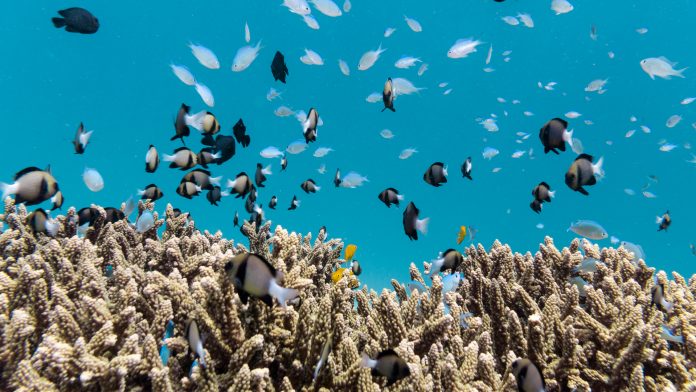A study led by Lancaster University finds that despite damage, bleached coral reefs are still supporting the ecosystems of diverse small-scale fisheries; the fish being caught are rich in micronutrients vital to the health of millions of people in the tropics.
Coral reefs observed
More than six million people work in small-scale fisheries that rely on tropical coral reefs. Their catches help to feed hundreds of millions of coastal people in regions with a high prevalence of malnourishment, causing stunting, wasting and anaemia. However, until now, the nutritional composition of coral reef fish catches, and how climate change might affect the nutrients available from reef fisheries, was unclear.
Researchers from Lancaster University and an international team of researchers from the Seychelles, Australia, Canada and Mozambique investigated and monitored coral reefs for a twenty-year period. The team focused on the area of Seychelles, where the tropical reefs were damaged by a large coral bleaching event in 1998, killing an estimated 90% of the corals.
Following the mass-bleaching event, around 60% of the coral reefs recovered to a coral-dominated system, however around 40% were transformed to reefs dominated by seaweeds. These differences provided a natural experiment for the scientists to compare the micronutrients available from fisheries on reefs with different climate-driven ecosystem compositions.
What they discovered, despite the damage inflicted by the rising sea temperatures is something they describe as a ‘bright spot’ of hope for the communities who depend on this ecosystem for food security. This is because despite the damage caused by climate change, the coral reefs are still able to support the ecosystem successfully enough to ensure that the fish are rich in micronutrients.
Thus, despite the bleaching events that kill coral reefs and can result in the composition of reef ecosystems, reef fisheries can remain rich sources of micronutrients for the community’s dependent upon them, increasing the nutritional value for some minerals.
Further findings and concerns
Scientists reveal that the availability of micronutrients from coral reefs’ small-scale fisheries may be more resilient to climate change than previously thought. This discovery is vital in increasing scientists’ understanding as continued global warming means that events— such as coral bleaching—are becoming more frequent and more severe, which can put greater stress on vulnerable ecosystems.
“Our findings underline the continuing importance of these fisheries for vulnerable coastal communities, and the need to protect against over-fishing to ensure long-term sustainability of reef fisheries,” explained Dr James Robinson, leader of the study.
The scientists, who used a combination of experimental fishing, nutrient analysis, and visual surveys of fish communities in the Seychelles, calculated that reef fish are important sources of selenium and zinc, and contain levels of calcium, iron and omega-3 fatty acids comparable to other animal-based foods, such as chicken and pork.
They also found that iron and zinc are more concentrated in fish caught on reefs that have been transformed after coral bleaching and are now dominated by macroalgae such as Sargassum seaweeds. These seaweeds have high levels of minerals, which, researchers believe is a key reason why the algal-feeding herbivorous fishes found in greater numbers on transformed coral reefs contain higher levels of iron and zinc.
“Coral reefs fish contain high levels of essential dietary nutrients such as iron and zinc, so contribute to healthy diets in places with high fish consumption. We found that some micronutrient-rich reef species become more abundant after coral bleaching, enabling fisheries to supply nutritious food despite climate change impacts. Protecting catches from these local food systems should be a food security priority,” explained Dr Robinson.
Despite the hopeful results researchers have discovered, they have emphasised that continued understanding of the long-term impacts of climate change regarding coral reefs’ fisheries, and data from other regions, is an urgent priority.
Additionally, the researchers believe that the results underline the need for an effective local management to protect the sustainability of coral reefs fisheries’, as well as policies that retain more of reef fish catches for local people and promote traditional fish-based diets. These can help reef fisheries to best contribute to healthy diets across the tropics.
“Fish are now recognised as critical to alleviating malnutrition, particularly in the tropics where diets can lack up to 50% of the micronutrients needed for healthy growth. This work is promising because it suggests reef fisheries will continue to play a crucial role, even in the face of climate change, and highlights the vital importance of investing in sustainable fisheries management,” concluded Professor Christina Hicks, co-author of the study.









